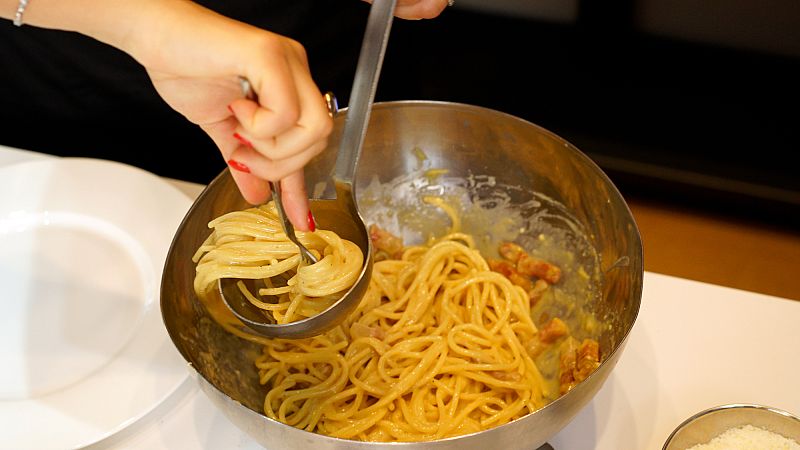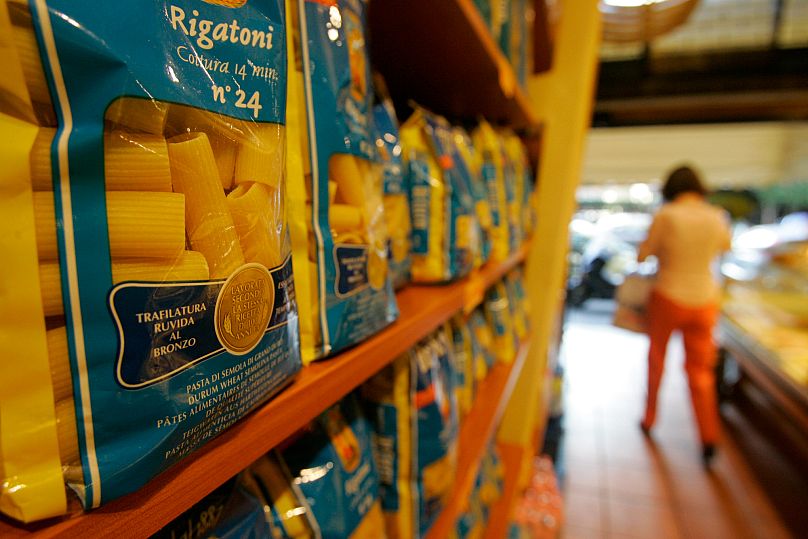Feeling the strain: Italian pasta makers reach boiling point over Trump tariffs

In the global trade storm unleashed since US President Donald Trump’s return to power, Italian pasta producers are feeling very much alone.
On 4 September, the US Department of Commerce announced preliminary tariffs of 91.74% on 13 pasta brands.
If upheld, the tariffs would take effect in January 2026, delivering a significant blow to Italy, which exported nearly €700 million worth of pasta to the United States in 2024.
“It’s unfair, it’s a protectionist action of the US against Italian pasta,” Margherita Mastromauro, president of Unione Italiana Food, the largest association of food producers in Italy, told Euronews.
After flying under the radar for a month, the case is now drawing increasing attention, driven by pressure from Italian industry players.
Nevertheless, in the US administration’s tariff battle, pasta stands out as a special case.
It originated in 1996, when US pasta producers accused Italian manufacturers of dumping — selling their products in the American market at prices lower than those in Italy.
Since then, Italian producers have been regularly subject to tariffs, but never of the magnitude now decided by the Trump administration.
Combined with the 15% duties that now apply to EU imports into the US, the total tariff burden would reach 106.74% if implemented. The pasta makers say this is brutal.
“We need help, because a large part of our companies are involved. With a duty so high, it means that all these companies will not export until the new review will be done," Mastromauro said.
The investigation covered the period from 1 July 2023 to 30 June 2024. Italian producers hope the 2025 year-end review will bring them some relief. But for now, the future remains uncertain.
Can the fight become political?
The companies have been scrambling to get these tariffs lifted since September.
Two of them, Garofalo and La Molisana, have taken legal action against the decision.
The Italian government and the European Commission have begun to get involved. However, room for manoeuvre remains limited in what is, according to the president of Unione Italiana Food, more a “legal” than a “political” matter.
Italian Agriculture Minister Francesco Lollobrigida denounced "a hyper-protectionist mechanism against our pasta producers".
And in Washington, Italian representatives are actively working to make their voices heard.
The Italian Foreign Ministry has said the duties were “disproportionate” and has joined the case before the US Department of Commerce as an “interested party” to weigh in favour of this key sector of Italy’s economy.
For its part, the Commission — which has seen trade disputes with the US pile up in recent months — is staying prepared. Dialogue is one path possible through the channels opened by the tariff agreement concluded in July between Brussels and Washington, which set US duties on EU imports at 15%.
Its implementation is being closely monitored on both sides of the Atlantic, amid persistent doubts over whether Trump will keep his word.
It is unclear whether Italian pasta will make its way onto the list of European demands, with the EU still negotiating to remove 50% US tariffs on EU steel and to secure exemptions from the blanket 15%.
Asked by Euronews, an EU official conceded that, unlike the unilateral tariffs imposed on other EU products — which violate rules of the World Trade Organisation (WTO) which regulates international trade — the US anti-dumping action against pasta appears to be done in a traditional way, as a trade defence mechanism allowed by the WTO.
“We are closely monitoring the case, and if there are flaws in the investigation, we will question it and we will raise the issue with the WTO,” the official told Euronews.
If that were the case, it could lead to retaliatory measures from the EU.
The European Parliament is not standing idly by either, even though, when it comes to trade matters, it is the European Commission that holds the competence.
Socialist Italian MEP Brando Benifei, who leads the Parliamentary delegation for relations with the US, condemns the US action that he considers “clearly discriminatory”.
“This has to be solved and we urge the Commission to act through,” he told Euronews.
But why target Italy? The question arises, given that Italian Premier Giorgia Meloni is known for her good relations with Trump.
A European source told Euronews that this case could result from a dispute between the US Trade Representative and the US Department of Commerce, the two main arms of the American administration in trade policy.
Both have been juggling responsibilities since Trump’s return, and one may have tried to outdo the other by targeting the iconic Italian pasta.
Today


